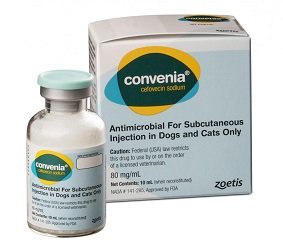If your cat has tissue infections in its body or is simply suffering from skin problems, then your vet may prescribe Convenia for cats. Convenia is a very common medication that is used to treat both felines and canines especially in conditions of rashes and other skin issues.
Are you hesitant to administer convenia to your cat? If yes, then keep reading this article because it will inform you about all you need to know about this medication for your feline friend.

What exactly is Convenia for cats?
Convenia is a kind of antibiotic and goes by the scientific name of Cefovecin. It contains immunity to certain types of bacteria and is used to cure the cat of disease.
As mentioned above, convenia is mainly used to treat skin problems, such as rashes, wounds, and sometimes infections in the urinary tract of the cat to kill off certain bacteria.
It is given as an injection into the cat’s body, one injection will give around 2 weeks immunity to the cat from whatever disease it is fighting from.
How does Convenia work?
Like most antibiotics, Convenia works in a similar way.
When a dose of convenia is given to the cat via injection, the antibiotic starts the spread and fights against the bacteria present in the body.
It does this by creating antibodies that will make the bacteria break down its cell walls. This will cause the antibody to enter the membrane and the bacteria will die.
This whole process takes around 14 days, after which there will be no signs of the antibiotic in the body because its work will be done.
It is important to note that not all bacteria can be killed off with convenia injections. It works well on bacteria that affect the skin and urinary procedures.
For this reason it is important to consult your vet to make sure your cat needs a convenia dose.
Are there any side effects after using Convenia?
Convenia does not cause any major side effects in cats.
That being said, it can cause some minor reactions if not given correctly.
If you are giving convenia to your cat, make sure you do not use convenia for dogs, as it can cause a negative reaction on your cat’s skin.
Both of them are clearly separated by label, but if you have both dogs and cats in the house, this confusion can occur.
You should avoid giving convenia to younger cats. The ideal age when you can start giving convenia is about 2 months or more in cats.
If your cat has other diseases other than skin problems, then you should avoid giving convenia to it until you consult a doctor.
Also, you will need to have a vet prescription before you can purchase convenia from the pharmacy, and not to mention, will have to get it administered professionally as it is the best option.
Lastly, make sure you do not overdose! If you feel that convenia is not working on your cat, avoid giving it another dose in the span of 2 weeks.
This will cause a negative effect on the immune system of the cat because of the increase in antibodies, and can also develop into an autoimmune disorder (if overdosed a lot).
Precautions while using convenia for cats
If you have been prescribed Convenia to treat your cat’s disease by the vet, then you must make sure that your cat is not allergic to convenia.
If it does happen to give an allergic reaction, then there is also a possibility that its current skin issue gets worse.
If your cat is going to have a baby, do not feed her. Vets also suggest waiting at least 3-3.5 months before allowing the cat to breed again.
Lastly, besides the cat, you want to keep yourself safe too. Use gloves while handling the medication and immediately dispose of the injection after use to avoid contamination.
Remember to wash your hands thoroughly if you come in contact with convenia.
Conclusion
In conclusion, convenia for cats is really helpful to get rid of skin problems and urine excretion issues in cats. However, there are some situations where deaths can occur due to convenia.
Convenia is actually a form of antibiotic, which is why it fights off bacteria in the body by breaking down cell walls.
There are not many serious side effects of the medication, although minor issues may pop up sometimes.
Precautions such as not giving Convenia to young kittens, breeding cats, and using the right kind and dose of the medicine is important to avoid mishaps.
Finally, it is important that you visit your vet and discuss its situation beforehand, so that you know that Convenia is the right fit for its needs.
Note that you will need a vet’s prescription to get the medicine, so don’t forget to ask for one when leaving their office.
